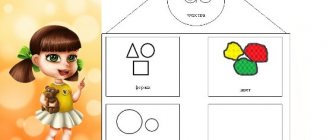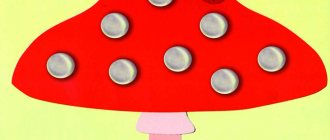Calendar and thematic planning for the Public Association “Communication” in the senior group (September-December)
Elena Plakhova
Calendar and thematic planning for the Public Association “Communication” in the senior group (September-December)
1 04.09.13 “We are senior ”
Give children the opportunity to feel proud that they are now
senior preschoolers .
Remind them of what they do in speech development classes. Improve dialogic speech. V. V. Gerbova “Classes on speech development in the senior group ”
p. 26 Didactic game “Greet a friend”
.
2 09/05/13 Examination of illustrations on the topic “School”
Remind children about what school is and what they do there. Learn to make sentences based on illustrations. Activate and clarify vocabulary on this topic.
Abstract Didactic game
"School"
.
3 09/11/13 Telling a Russian folk tale
"The hare is a braggart"
.
Recall with your children the names of Russian folk tales and introduce them to a new fairy tale. Clarify the genre difference between the fairy tales. Improve dialogic speech. V. V. Gerbova
“Classes on speech development in the senior group ”
page 27 Dramatizing an excerpt from a fairy tale.
4 09.12.13 Retelling of the fairy tale “The Hare is a Braggart”
.
Learn to make a plan for retelling a fairy tale . Learn to retell a fairy tale, sticking to the plan .
V. V. Gerbova
“Classes on speech development in the senior group ”
page 27 Didactic game
"Find out the fairy tale"
.
5 09/18/13 Teaching storytelling: composing stories on the theme “Autumn has come”
».
Teach children to tell stories (personal experience, focusing on the plan . Introduce them to the perception of poetic works about nature. V. V. Gerbova
“Classes on speech development in the senior group ”
page 30 Didactic game
"Say the word"
6 09.19.13 Memorizing the poem by I. Belousov “Autumn”
Help children remember and expressively read I. Belousov’s poem “Autumn”
.
Develop memory and speech.
V. V. Gerbova
“Classes on speech development in the senior group ”
p. 32 Didactic game “What happens, happens”
.
7 09/25/13 Sound culture of speech: differentiation of sounds z-s Exercise children in clear, distinct pronunciation of sounds z-s and their differentiation; introduce the tongue twister. V. V. Gerbova
“Classes on speech development in the senior group ”
page 29 Didactic game
"Call me kindly"
8 09.26.13 Consideration of the plot painting “Autumn Day”
and writing a story based on it
Improve children's ability to compose narrative stories based on a picture, adhering to a plan . V. V. Gerbova
“Classes on speech development in the senior group ”
Page 33 Game
"Tic Tac Toe"
.
9 O2.10.13 Compiling a story from experience based on the plot picture “My Family”
.
Expand knowledge on the topic “Family”
;
consolidate the concept of family relationships; cultivate respect for elders ; Improve children's ability to compose narrative stories based on a picture, adhering to a plan . Complex classes according to the program “From birth to school”
edited by N. E. Veraksa
page 86 Game exercise “Who lives where?”
.
10 03.10.13 Memorizing the poem by E. Blaginina “Let’s sit in silence”
Learn to express positive emotions when listening to a poem;
Memorize a poem, learn to recite poems expressively. Cultivate love and respect for loved ones. Complex classes according to the program “From birth to school”
edited by N. E. Veraksa
p. 93 Examination of the illustration for the poem
E. Blaginina “Let’s sit in silence”
11 09.10.13 Compiling the story “Gifts of Nature”
Come up with a short story on the theme “Gifts of Nature”
.
Enrich and activate children's vocabulary. Complex classes according to the program “From birth to school”
edited by N. E. Veraksa
p. 95 Didactic game “Vegetable Garden”
.
12 10.10.13 Narration on the topic:
"Garden Plants"
Teach the ability to maintain a conversation4 express your point of view;
use generalizing words in speech, activate and enrich children’s vocabulary. Complex classes according to the program “From birth to school”
edited by N. E. Veraksa
p. 130 Role-playing game “Cooking Soup”
13 10/16/13 Learning to be polite Tell children about some important rules of behavior; about the need to comply with them; activate the corresponding words and figures of speech in the speech of preschoolers. V. V. Gerbova
“Classes on speech development in the senior group ”
p. 36 Game exercise “Call it kindly”
14 10.17.13 Teaching storytelling: description of dolls
Help children make a plan for describing the doll ; teach preschoolers, when writing a description on their own, to be guided by a plan . V. V. Gerbova
“Classes on speech development in the senior group ”
p. 38 Game exercise “Who will dress the doll faster?”
15 10/23/13 Story on the topic “Grandma’s worries”
Develop children's oral speech; Develop the ability to verbally describe a person; develop respect for adults Comprehensive classes according to the program “From birth to school”
edited by N. E. Veraksa
p. 111 Reading L. Kvitko “I am my grandmother”
».
16 10.24.13 Sound culture of speech: differentiation of s-ts sounds Reinforce the correct pronunciation of s-ts sounds; learn to differentiate sounds: distinguish in words; identify words with a given sound from phrasal speech, name words with the sounds s and tz; practice pronouncing words at different volumes and at different tempos. V. V. Gerbova
“Classes on speech development in the senior group ”
page 39 Listening to the poem I. Shchegolev "Early in the morning"
17 10.30.13 Examination and description of I. Shishkin’s painting “Rye”
. Teach verbal description; instill a love of art and native nature; enrich and activate the vocabulary.
Comprehensive classes according to the program “From birth to school”
edited by N. E. Veraksa
p. 112 Reading the poem by I. Vekshegonova “My Land”
18 10/31/13 Memorizing I. Surikov’s poem “Here is my village”
Introduce the work of I. Surikov;
learn to express positive emotions when listening to I. Surikov’s poem “Here is my village”
;
memorize a short excerpt from it Comprehensive lessons according to the program “From birth to school”
edited by N. E. Veraksa
p. 129 Exhibition of creative works jointly with parents on the theme “My native home”
19 11/20/13 Lexical and grammar exercises. Telling the fairy tale “Winged, furry and oily”
Exercise children in selecting nouns for adjectives, introduce them to the Russian folk tale
“Winged, Hairy and Oily
. V. V. Gerbova
“Classes on speech development in the senior group ”
p. 42 Dramatization of an excerpt from the fairy tale “Winged, hairy and oily”
.»
20 21.11.13 Reading poems about late autumn. Compiling complex sentences. Introduce children to poetry, develop a poetic ear. Practice composing complex sentences. V. V. Gerbova
“Classes on speech development in the senior group ”
p. 44 Didactic exercise “Complete the sentence”
21 11/27/13 Compiling a story - description “Fox”
.
Develop oral speech. Independently come up with and tell a short story or tale about a sly fox. Comprehensive classes according to the program “From birth to school”
edited by N. E. Veraksa
p. 131 Didactic exercise “Complete the sentence”
22 11/28/13 Retelling the story
V. Chaplina “Squirrel”
Learn to express positive emotions when listening to a story; learn to reason and give adequate explanations to the questions posed; retell the text in a coherent and consistent manner. Comprehensive classes according to the program “From birth to school”
edited by N. E. Veraksa
page 95 Riddles about the squirrel.
.
23 04.12.13 Compiling the story “Games in Winter”
Learn to maintain a conversation and express your point of view.
Learn to write your own story on a given topic. Complex classes according to the program “From birth to school”
edited by N. E. Veraksa
p. 149 Examination of illustrations on the theme “Winter fun”
24 05.12.13 Sound culture of speech. Working with sounds zh-sh. Practice clearly pronouncing words with the sounds w and w; develop phonemic hearing; exercise in distinguishing familiar sounds by ear, in the ability to differentiate the sounds w and w; practice speech breathing. V. V. Gerbova
“Classes on speech development in the senior group ”
page 48 Learning tongue twisters.
25 12/11/13 Memorizing S. Yesenin’s poem “Birch”
Introduce S. Yesenin’s poem
“Birch”
;
activate the sensory perception of the artistic word, reveal the author’s attitude to nature; cultivate a sense of beauty and interest in words. Complex classes according to the program “From birth to school”
edited by N. E. Veraksa
p. 162 Conversation about birch, looking at illustrations.
26 12.12.13 Story on the topic “Trees in winter”
Learn to reason, express your point of view;
improve the ability to compose a story from a presentation; cultivate a love for nature. Complex classes according to the program “From birth to school”
edited by N. E. Veraksa
p. 164 Dynamic pause
"Trees in Winter"
27 12/18/13 Retelling of the Eskimo fairy tale “How the fox offended the bull”
Help you understand and remember the content of the Eskimo fairy tale
“How the fox offended the bull”
Learn to retell it. V. V. Gerbova
“Classes on speech development in the senior group ”
p. 57 Didactic game “Say a word”
28 12/19/13 Story on the theme “Foxes”
.
Develop oral speech; enrich vocabulary; learn to write stories about animals. Complex classes according to the program “From birth to school”
edited by N. E. Veraksa
page 180 Riddles about the fox.
29 12/25/13 New Year's kaleidoscope of poems
K. Fofanova “Dressed up the Christmas tree”
Learn a short poem and recite it expressively; help construct statements logically and meaningfully; create a festive mood; develop the memory of V.V. Gerbov
“Classes on speech development in the senior group ”
p. 62 Memorizing poems about the New Year.
30 12/26/13 Conversation based on the story by S. Georgiev “I saved Santa Claus”
. Develop the creative imagination of children, help logically and meaningfully V. V. Gerbova
“Classes on speech development in the senior group ”
p. 65 Didactic games with words.

